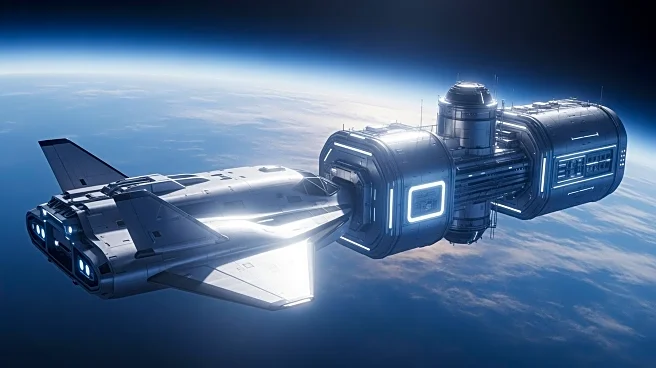What's Happening?
Orbit Fab, a Colorado-based company, has secured a contract from the European Space Agency (ESA) and the UK Space Agency valued at £1.3 million ($1.7 million) to demonstrate in-space refueling capabilities by 2028. This initiative, known as the Advance
Satcom Technology with Refueling and Logistics (ASTRAL) contract, is co-funded through ESA’s ARTES program and has a total value of $3.8 million. The project involves a consortium of European partners from the UK, Austria, and Lithuania. Orbit Fab has previously achieved milestones such as resupplying the International Space Station (ISS) and developing a refueling valve approved by the US Space Force. The ASTRAL mission aims to build European capability to refuel satellites using technology developed in Harwell, UK, and European supply chains. The consortium will utilize Orbit Fab’s GRASP interface to dock with target spacecraft and transfer propellants like Nitrous Oxide, Ethane, and Xenon using the RAFTI fueling port.
Why It's Important?
The ASTRAL mission is significant for Europe’s sovereign defense goals, as it enhances self-reliance in critical space capabilities. The ability to refuel satellites in space is crucial for maintaining freedom of maneuver, especially in higher orbits like GEO, where many secure communication satellites operate. This capability is increasingly vital as these orbits become more contested. The success of the ASTRAL mission could lead to further funding and expansion of the consortium, strengthening Europe’s position in space technology and defense. It also represents a strategic move towards building a robust infrastructure for satellite operations, which is essential for both civil and military applications.
What's Next?
Orbit Fab anticipates receiving additional funding and expanding the consortium with more European partners by spring. The development of in-space refueling technology will continue, with the goal of achieving regular and reliable refueling services. This advancement could lead to new opportunities for collaboration and innovation in the space industry, potentially influencing global space policies and defense strategies. As the project progresses, stakeholders will likely monitor its impact on Europe’s space capabilities and its implications for international space cooperation.
Beyond the Headlines
The ASTRAL mission highlights the growing importance of space technology in national security and defense strategies. It underscores the need for countries to develop independent capabilities to ensure strategic autonomy in space. The project also reflects broader trends in the space industry, where collaboration between civil and military sectors is becoming increasingly common. This integration could lead to advancements in technology and infrastructure that benefit both sectors, fostering innovation and enhancing global security.















